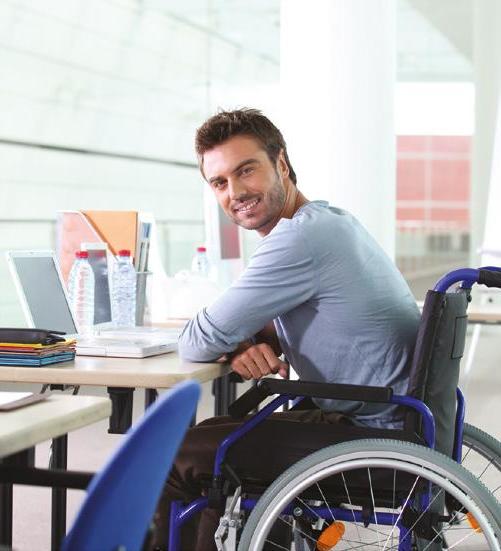
3 minute read
Disabled Candidates are Premium Candidates
Disabled Candidates are Premium
Candidates

The skills you develop as a disabled person are skills most employers are looking for.
I have long believed that most disabled people make premium candidates. As people, we of course have the same diverse range of skills, qualities and talents as everyone else. And in addition to those, we will have developed other skills through living in a society not designed for us.
One of these skills is that, for most of us, things other people might take for granted require a bit more thought and planning. For example, a trip to meet someone in town might need to be planned like a military exercise, whereas most people just hop onto a bus or into a car and go. As a disabled person, we might have to consider the journey. If we drive, what’s the quickest route? Will there be accessible parking bays? If so, how far are these from the venue we are meeting at? Will the route between the car park and venue be accessible, whether flat for wheelchair use, or a few steps for people with energy issues? Or, if using public transport, will the bus, train or tube be accessible? What about the stations or stops at either end? Do I need to contact someone beforehand to ensure a ramp will be available?
Having planned the journey, there may be other considerations. How accessible is the venue? Are there accessible toilets? Will the menu have the foods I need? Will it be too busy, loud or confusing? Will the person I’m meeting understand why I might need or want different things, or should I discuss it with them beforehand?
This is everyday life for many disabled people, and it means we develop all sorts of skills, such as project management, research, anticipation, organisation, planning ahead. Skills which are useful in most roles with most employers.
Another skill we often develop is creative problem-solving. Living in a largely inaccessible world means we can’t always do things the same way as others.
Maybe we use assistive technology to help us. I find it difficult to sit for long periods of time, so I’ve found creative ways to use a computer lying down, or sitting awkwardly on a settee. Some of us work from home, rather than in an office. People who struggle with short term memory write, type or record lots of lists, to ensure nothing gets forgotten.
All of these skills mean that we tend to be more flexible, agile and adaptable than most non-disabled people. These have always been important skills in the workplace, and never more so than right now.
The world of work is undoubtedly evolving and changing as a result of the pandemic. How it will change is still uncertain, but one thing we can be sure of is that flexibility, creativity and finding different ways of doing things will become increasingly important.
As disabled people, we have been doing this forever – we are masters in the art of finding new, different and effective ways of achieving results. When people were telling us that most work couldn’t possibly be done from home, we were already doing it. When we were being told that there is only one way of completing a particular task, we had already found a number of different ways of approaching it successfully.
So, when disabled people are looking for work in the new post-Covid world, don’t forget that, even more than before, we are premium candidates with much of value to offer.
Author: Jane Hatton, Director of Evenbreak Website: evenbreak.co.uk/en Twitter: twitter.com/evenbreak Facebook: facebook.com/Evenbreak/











